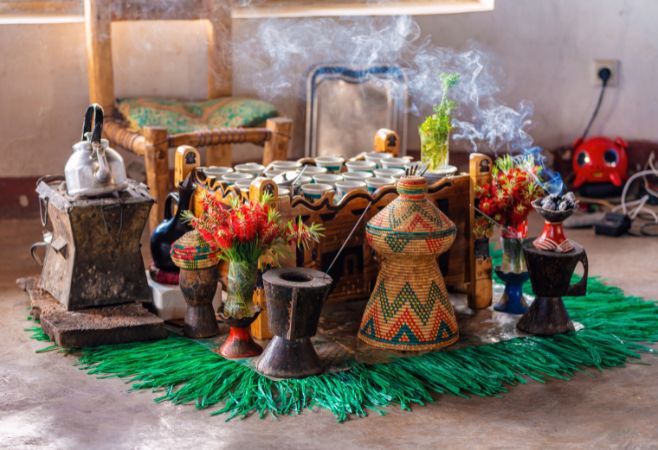What Items Tourists Cannot Take Out of Ethiopia?
When planning to leave Ethiopia, travelers should be aware of the country's stringent export rules. The following is a list of products that are either prohibited or limited from leaving Ethiopia, intended to enable you to travel with confidence and respect for local rules.
1. What Items Are Banned from Being Taken Out of Ethiopia?
Certain items are strictly prohibited from exportation due to cultural and legal reasons. These include:
Antiques and historical artifacts: Ethiopian cultural relics and heritage items cannot be taken out without special permission.
Religious manuscripts and icons: Old religious books, crosses, and other artifacts are restricted unless authorized by the Ethiopian Orthodox Church or the National Museum.
Wildlife and plant species: Protected plants, animal skins, and hunting trophies are subject to restrictions.
Local currency exceeding the legal limit: Travelers cannot carry more than 3,000 Ethiopian birrs when leaving the country.

Directive No. 927/2022, which became effective on September 5, 2022, regulates the amount of Birr and foreign currency that individuals are allowed to carry when entering or exiting Ethiopia.
2. Prohibited Items to Take Out of Ethiopia
When departing Ethiopia, ensure you do not pack any of the following restricted items:
Unprocessed gold or precious stones: These require special export permits.
Certain food products: Raw meat and unapproved agricultural items may be restricted.
Cultural artifacts and traditional crafts of significant historical value: Some handicrafts, especially ancient artifacts, may need approval before exportation.
3. What Is Illegal to Take Out of Ethiopia?
Exporting certain goods without authorization can result in penalties or confiscation at customs. Key items that are illegal to take out include:
Archaeological items: Any historical or archaeological finds are the property of the state.
Traditional medicine and rare plants: Some herbal remedies and medicinal plants are restricted.
Ivory and endangered species products: Taking these items out of Ethiopia is prohibited under international conservation laws.

Taking ivory and endangered species products out of Ethiopia is prohibited
4. Restricted Items at Ethiopian Airport
Ethiopian customs authorities enforce strict regulations on items carried by departing passengers. Some restricted goods may be subject to screening, taxes, or additional paperwork, including:
Currency Restrictions: Travelers are required to declare amounts exceeding $3,000 (or equivalent in other currencies) when entering or leaving Ethiopia.
Tobacco and alcohol: Limits apply to the amount you can carry.
Prescription medication: Some prescription drugs may require documentation to prove they are for personal use. Always carry a doctor’s prescription for any medications you are carrying.
Agricultural Products: Fresh fruits, vegetables, and plants may be restricted to prevent the spread of pests and diseases.
Khat: Legal in Ethiopia but illegal to export; it’s often searched for at Bole International Airport, and possession during departure can lead to prosecution.
Electronics and high-value goods: Expensive cameras, drones, and tech devices may require declaration.
5. Ethiopia Souvenir Restrictions
Ethiopia offers a variety of unique souvenirs, but not all of them can be taken home. Some items are subject to export restrictions:
Religious Items: Crosses, icons, and other religious artifacts may require special permission to export.

Ethiopian souvenirs at the local market
Handwoven textiles and local crafts: Most traditional items, like woven baskets, pottery, and jewelry, are permitted, but rare or antique items might be restricted.
Coffee beans and spices: While coffee is a popular souvenir, there are quantity limits when taking it abroad. You can take small quantities (up to 2 kg) for personal use. However, exporting large quantities requires a permit.

For personal use, you can take up to 2 kg of coffee when leaving Ethiopia without a permit
What Happens If You Break the Rules?
Failing to comply could lead to fines, confiscation of items, or even legal consequences.
- Confiscation: Prohibited items will be seized at the airport or border.
- Fines: Violators may face hefty fines.
- Legal Action: In severe cases, legal action or imprisonment may occur.
Tips to Travel Smart and Stay Compliant
Here’s how to leave Ethiopia smoothly and respectfully:
- Hold Onto Receipts: When you buy jewelry, handicrafts, or cultural keepsakes, kindly ask for an official receipt. It’s your proof that these treasures are legal souvenirs, saving you potential headaches.
- Declare Your Valuables: Whether it’s gemstones, artifacts, or anything precious, let customs know when you arrive and before you go. Planning to take antiques or religious items? Secure export approval ahead of time—it’s worth the effort.
- Stay in the Know: Customs rules can shift, so take a moment to double-check the latest with the Ethiopian Revenue and Customs Authority before your trip. It’s peace of mind well-earned.
- Be Open About Cash: Carrying a lot of money or valuable items? Declare them at customs. It’s a simple step to avoid any last-minute snags.
Why This Matters
Like any country, Ethiopia has strict regulations regarding what items tourists can bring in and take out of the country. Sticking to these tips does more than keep you on the right side of the law—it’s a way to honor and protect Ethiopia’s incredible cultural legacy and natural beauty for years to come. Wishing you a wonderful, worry-free journey!
Related Articles
- Nechisar National Park Travel Guide for First-Time Visitors
- Ethiopia Yellow Fever Vaccine Requirements for Travelers
- Ethiopian Rift Valley: A Complete Travel & Geography Guide
- Ethiopia e-Visa for Minors: Guide for Parents and Families
- Top Active Volcanoes in Ethiopia You Must See
- Experiencing the Ethiopian Coffee Ceremony as a Visitor
- Exploring Dorze Village: What to See and Do
- Top Travel Apps for Visiting Ethiopia
- Top Destinations for Historic Holidays in Northern Ethiopia





